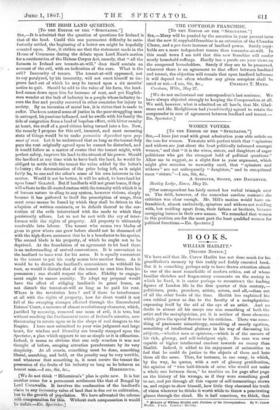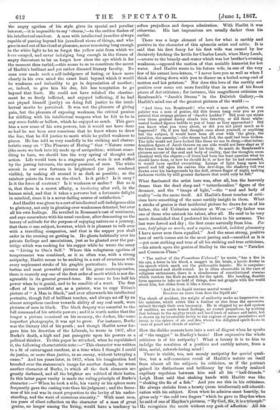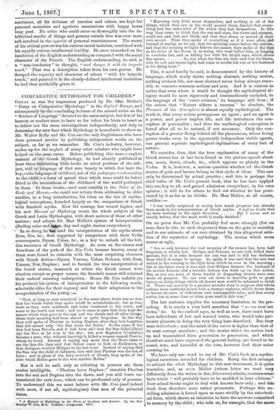B OOKS.
WILLIAM HAZLITT.*
[SECOND NOTICE.]
WE have said that Mr. Carew Hazlitt has not done much for his grandfather's memory by this rashly and feebly executed book. But it is something perhaps only to have drawn attention afresh to one of the most remarkable of modern critics, out of whose familiar sketches and fragmentary comments on the society in which he lived, it is easier perhaps to reconstruct the leading figures of Loudon life in the first quarter of this century,— politicians, poets, preachers, artists, actors, and all,—than out of all the other books of the time. Hazlitt has explained his own critical power as due to the faculty of a metaphysician expressing itself by the aid of the eye of an artist. And no doubt in almost all his essays one sees something of both the artist and the metaphysician, yet it is neither of these elements which gives the special flavour to his criticism. There was some- thing of passionate misanthropy, something of moody egotism, something of intellectual gluttony in his way of discussing his subjects,—whether men or opinions,—which is of the essence of his rich, gloomy, and self-indulgent style. No man was ever capable of higher intellectual candour towards an enemy than Hazlitt. Indeed, it added to his enjoyment of animosities to feel that he could do justice to the objects of them and hate them all the same. Thus, for instance, in one essay, in which, by the way, he quotes, with a sort of gloomy gratification, the opinion of "two half-friends of mine who would not make a whole one between them," he rambles on for page after page on the history of his wrongs, as if they were something good to eat, and yet through all this vapour of self-tormentings shows us, and enjoys to show himself, how little they obscured his truth of vision wherever he thinks it worth while to throw a penetrating glance through the cloud. He is half conscious, we think, that • Memoirs of Walking Hos:444104h Portions of his Correspondence. By W. Carew Harlitt. 2 TO:11. London: Bentley. the angry egotism of his style gives its special and peculiar interest,—it is impossible to say charm,'—to the sudden flashes of his intellectual candour. A man with intellectual jaundice always capable of passing beyond his jaundiced views of things, and who goes in and out of his cloud at pleasure, never remaining long enough in the white light to let us forget the yellow mist from which we hive escaped, and never indulging long enough in the throes of angry discontent to let us forget how clear the eye which is for the moment thus turbid,—this seems to us to constitute the secret of Hazlitt's brilliant and yet rather diseased literary faculty. No man ever made such a self-indulgence of hating, or knew more clearly in his own mind the exact limit beyond which it would be weakness and imbecility to go in depreciation of another ; or, indeed, to give him his due, felt less temptation to go beyond that limit. He could not have relished the chastise- ment he so freely inflicted, and enjoyed inflicting, if he had not piqued himself (justly) on doing full justice to the intel- lectual merits he perceived. It was not the pleasure of giving pain, but the pleasure of exposing weakness, the critical passion for riddling with his intellectual weapons what he felt to be in any sense feeble or hollow, which he enjoyed so much. This gave him a new sense of his own powers, but it would not have done so had be not been ever conscious that he knew where to draw the line, that he did justice to merit while he pulled weakness to pieces. He has told us very candidly in his striking and charac- teristic essay on "The Pleasure of hating" that "Nature seems (the more we look into it) made up of antipathies ; without some- thing to hate, we should lose the very spring of thought and action. Life would turn to a stagnant pool, were it not ruffled by the jarring interests, the unruly passions of men. The white streak in our own fortunes is brightened (or just rendered visible), by making all around it as dark as possible ; so the rainbow paints its form on the cloud. Is it pride? Is it envy ? Is it the force of contrast? Is it weakness or malice? But so it is, that there is a secret affinity, a hankering after evil, in the human mind, and that it takes a perverse but a fortunate delight in mischief, since it is a never-failing source of satisfaction."
And Hazlitt was given to a sort of intellectual self-indulgence akin to gluttony, not only in gloating over weaknesses detected, but over all his own feelings. He revelled in Rousseau's cast of sentiment, and says somewhere with his usual candour, after descanting on the luxury of solitude for the purpose of enjoying nature on a journey, that there is one subject, however, which it is pleasant to talk over with a travelling companion, and that is the supper you shall order in the evening on getting in. He gloats habitually over his private feelings and associations, just as he gloated over the par- tridge which was cooking for his supper while he wrote the essay on "Living to One's Self." Where this voluptuous egotism of temperament was combined, as it so often was, with a strong antipathy, Hazlitt seems to be sucking in a sort of sweetness with every unpleasant stroke of his graphic portraiture. In his -iium- berless and most powerful pictures of his great contemporaries, there is scarcely any one of the first order of merit which is not dis- agreeable in its general ground-tone. He seems to lose half his power when he is genial, and to be sensible of a want. The first effort of his youthful art, as a painter, was to copy Titian's picture of " A Man in Black," and ever afterwards his intellectual portraits, though full of brilliant touches, and always set off by an almost scrupulous candour towards ability of any real mark, were pictures of men in black. The black drapery was essential to the full command of his artistic powers ; and it is worth notice that the longer a picture remained on his memory, the darker, like some imperfect photographs, it was apt to grow. For instance, Burke was the literary idol of his youth ; and though Hazlitt never for- gave him his desertion of the Liberals, he wrote in 1807, after Burke's death, a high and just panegyric upon his powers as a political thinker. To this paper he attached, when he republished it, the following characteristic note:—" This character was written in a fit of extravagant candour, at a time when I thought I could do justice, or more than justice, to an enemy, without betraying a cause." And ten years later, in 1817, when his imagination had brooded over the statesman's image for another decade, he wrote another character of Burke, in which all the dark elements are greatly darkened, and all the brighter are robbed of their lustre. In this latter paper vanity is made the ruling principle of Burke's character :—" When he took a side, his vanity or his spleen more frequently gave the casting vote than his judgment ; and the fierce- ness of his zeal was in exact proportion to the levity of his under- standing, and the want of conscious sincerity." With most men, ten years of silent reflection on the character of a man of great genius, no longer among the living, would have a tendency to
soften prejudices and deepen admiration. With Hazlitt it was otherwise. His last impressions are usually darker than his earlier.
There was a large element of love for what is earthly and positive in the character of this splenetic artist and critic. It is said that his first fancy for his first wife was caused by her decisively fetching the kettle for Charles Lamb, when Mary Lamb, —averse to the brandy-and-water which was her brother's evening weakness,—opposed the motion of that amiable humorist for hot water. And Hazlitt wrote to his future wife, in one of the very few of his extant love-letters, "I never love you so well as when I think of sitting down with you to dinner on a boiled scrag-end of mutton and hot potatoes." Nor does this love of the earthly and positive ever come out more forcibly than in some of his finest pieces of Art criticism ; for instance, this magnificent criticism on
Rembrandt's "Jacob's Dream" in the Dulwich Gallery,—in Hazlitt's mind one of the greatest pictures of the world :-- "And thou, too, Rembrandt! who weit a man of genius, if ever painter was a man of genius, did this dream hang over you as you painted that strange picture of 'Jacob's Ladder ?' Did your eye strain over those gradual dusky clouds into futurity, or did those white- vested beaked figures babble to you of fame as they approached Did you know what you were about, or did you not paint much as it happened? Oh, if you had thought once about yourself, or anything but the subject, it would have been all over with the glory, the intuition, the amenity,'—the dream had fled, the spell had been broken. The hills would not have looked like those we see in sleep,—that tatter- demalion figure of Jacob thrown on one side would not have slept as if the breath was fairly taken out of his body. So much do Rembrandt's pictures savour of the soul and body of reality, that the thoughts seem identical with the objects;—ii there had been the least question what he should have done, or how he should do it, or how far he had succeeded, it would have spoiled everything. Lumps of light hung upon his pencil and fell upon his canvas like dew-dops, the shadowy veil was drawn over his backgrounds by the dull, obtuse finger of night, making darkness visible by still greater darkness that could only be felt."
What fascinated the artist here was, after all, less the heavenly dream than the dead sleep and "tatterdemalion" figure of the dreamer, and the "lumps of light,"—the "soul and body of reality"--in the scene itself. All Hazlitt's finest touches of criti- cism have something of the same earthly insight in them. What a stroke of genius is that incidental picture he draws for us of his father, the old Unitarian minister at Wem :—" My father was one of those who mistook his talent, after all. He used to be very much dissatisfied that I preferred his letters to his sermons. The
last were forced and dry ; the first came naturally from him. For ease, half-plays on words, and a supine, monkish, indolent pleasantry
I have never seen them equalled." And the same strong, positive love of earth comes out in the most jarring and—onesided as it is —yet most striking and true of all his striking and true criticisms, —his attack upon the genius of Shelley in the essay on "Paradox and Common-Place."
"The author of the Prometheus Unbound," he wrote, "has a fire in his eye, a favor in his blood, a maggot in his brain, a hectic flutter in his speech which mark out the philosophic fanatic. Ho is sanguine- complexioned and shrill-voiced. As is often observable in the case of religious enthusiasts, there is a slenderness of constitutional stamina which renders the flesh no match for the spirit. His bonding, flexible form appears to take no hold of things, does not grapple with the world about him, but slides from it like a river,—
' And in its liquid texture mortal wound Receives no more than does the liquid air.'
The shock of accident, the weight of authority make no impression on his opinions, which retire like a feather or rise from the encountet unhurt through their own buoyancy. Ho is clogged by no dull system of realities, no earth-bound feelings, no rooted prejudices, by nothing that belongs to the mighty trunk and hard husk of nature and habit, but is drawn up by irresistible levity to the regions of mere speculation and fancy, to the sphere of air and tire, where his delighted spirit flo.ita in seas of pearl and clouds of amber.'"
How the dislike mounts here into a sort of disgust when he speaks of "the maggot" in Shelley's brain! How expressive the whole criticism is of his antipathy ! What a luxury it is to him to indulge the revulsion of a positive and earthly nature, from a thin, aerial, cobweb-loving mind !
There is visible, too, not merely antipathy for special quali-
ties, but a self-conscious recoil of Hazlitt's nature on itself from almost all the subjects he criticizes, as if the portrait gained its distinctness and brilliancy by the clearly realized capillary repulsion between him and all his half-friends."
Leigh Hunt said that shaking hands with Hazlitt was like "shaking the fin of a fish." And you see this in his criticisms.
He always shrinks from a hearty (even intellectual) self-identifi- cation with his subject. Even when he admires most heartily, he
gives only "the cold two fingers "which he gave to Haydon when he said of one of Haydon's pictures,- " By God, Sir, it is a triumph!" He recognizes the merit without any gush of affection. AlLhis
sentiment, all his richness of emotion and colour, are kept for personal memories and egotistic associations with happy hours
• long past._ No critic who could enter so thoroughly into the in- - tellectuad merits of things and persons outside him was ever more - self-involved in the appetite of personal reminiscences. The secret of his critical powers was his curious moral isolation, combined with his equally curious intellectual lucidity. He once remarked on the insulation Of the English understanding as compared with the social cliaractei of the French.. The English understanding, he said, is a " non-eonductor "-to thought,'" and damps it with its torpedo touch." ' That was a description taken from his own genius. He damped the capacity and character of others "with his torpedo touch," and painted it In the clearly-defined intellectual insulation he had thus artificially given it. '
































 Previous page
Previous page